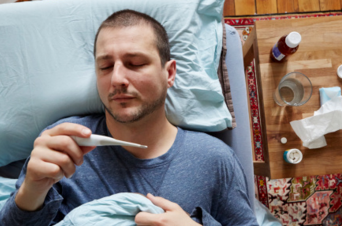As Americans we pride ourselves on being hardworking people. The standard work week is 40 hours, with Gallup clocking 46.7 hours as the national average for full time employees. This is standard for most developed countries. But the total annual hours worked in the United States is averaged at 1,789. That’s about 100 more than what the United Kingdom produces. That means the average American person clocks in an additional two and a half weeks of work compared to the average British person. That just means we’re more productive, putting in greater time and effort, right? The question is, how exactly are we getting those additional hours, if the standard is still 40 hours of work per week?
Americans have a bit of a problem when it comes to work. We’re afraid to take days off. In fact, many people go into work sick. This is especially common for those in lower income brackets. When you’re living from paycheck to paycheck, you can’t afford to have an off day. Going to work sick occurs in all occupations. However, where it occurs the most is in the food service industry.
You might ask yourself what kind of rational person who works in food production would go into work sick. Well, about 51 percent of food workers admitted they “always” or “frequently” go to work even when they’re sick, with 38 percent answering they “sometimes” do it.
It’s hard to pin this kind of job attachment on the employees. The Bureau of Labor Statistics reported that in 2013 only 23 percent of food service-based private companies offered paid sick leave, the lowest of all occupational categories. When wages are at stake, can you really afford to take a day off?
A sick employee essentially renders the whole point of food safety laws moot. By going into work they put their co-workers and the people being served at risk. Yet for many employees in the food industry, this is a more favorable outcome than staying home. For people trying to get by with low-income jobs, being sick is not just an inconvenience but the equivalent of losing money.
While this makes sense, the problem becomes amplified when you decide it would be better just to show up to work. Saru Jayaraman, author of Behind the Kitchen Door, reported a case in North Carolina where an employee at Olive Garden showed up to work infected with Hepatitis A, resulting in 3,000 people having to go to the hospital to get tested. While it’s obvious to us that the man shouldn’t have shown up to work, look at the problem from his perspective. Maybe he couldn’t afford to go to the doctor and didn’t know he had Hepatitis A. Perhaps he was feeling under the weather, but nothing too obvious. Thinking it was just a minor flu, and worried about a stain on his record if he reported sick without any advanced notification, he went to work anyways. He couldn’t afford to lose a few days at a restaurant like Olive Garden, where he could be easily replaced. Of course he would go to work sick.
The majority of full-time workers do get some kind of paid sick leave. According to the Bureau of Labor Statistics, 74 percent of full-time workers get paid sick leave. However, the closer you get to lower income jobs, the more that percentage drops. Unfortunately, these are the very jobs that involve heavy social engagement.
Many are against paid sick leave, but any claim that it will negatively impact profit is totally bogus. An estimated $160 billion is lost annually due to “presenteeism,” the decrease in productivity when employees work sick. Refusing paid sick leave to your employees puts everyone at risk. Being able to subvert that risk with the potential loss of a few man hours is a much more favorable option.
While paid sick leave is currently not a mandatory expense for businesses, some recent measures have been taken. In September, President Obama signed an executive order allowing federal workers to earn up to seven days of paid sick leave a year. While this will only affect 300,000 government workers, many hope we’ll see greater change to benefits provided for low-income workers.
Paid sick leave should be mandatory for all businesses in the food industry. It’s outright irresponsible of a company to disregard the health of others for fear of a slight reduction in profits. Refusing paid sick leave guarantees the risk of sick employees infecting the workplace. For a job that has its own set of rules made to help prevent sickness from food poisoning, this a huge oversight.


